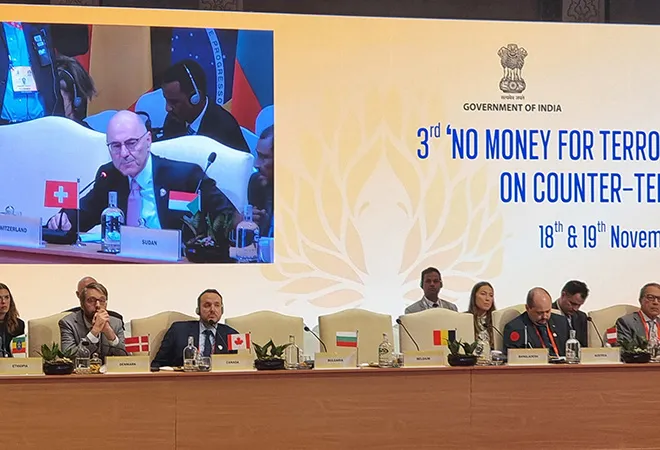-
CENTRES
Progammes & Centres
Location
For a nation such as India, which is among the countries most affected by terrorism, this is a time to take the lead in continuing to keep the spotlight on the menace of terrorism

For a nation such as India, which is among the countries most affected by terrorism, this is a time to take the lead in continuing to keep the spotlight on the menace of terrorism. This seems to be the guiding principle behind India convening three important meetings in recent weeks — the 90th INTERPOL (International Criminal Police Organization) General Assembly and the United Nations (UN) Security Council’s special meeting of the Counter-Terrorism Committee in October, as well as the Third Ministerial “No Money for Terror” conference earlier last week. New Delhi’s critical role in shaping the global discourse on terrorism is quite evident, as is its growing ability to bring together like-minded nations in tackling this challenge. For a long time, New Delhi has been lackadaisical in leveraging global platforms to serve its interests. Often, India’s tone was one of a petulant complainant that things weren’t going as it expected and, therefore, there was an inability to try to shape the global agenda. Today, India is much more confident in its ability to shape global outcomes. This was reflected in the assertions of Indian policymakers, where they not only identified the problem but also tried to chart out a proactive operational agenda for the future. At the third “No Money for Terror” conference, Prime Minister Narendra Modi underscored the need for a “uniform, unified and zero-tolerance approach” in tackling terrorism and for the imposition of costs upon countries that support terrorism. Home Minister Amit Shah targeted nations that use terrorism as an instrument of state policy and urged all nations to “rise above their geo-political interests.” More significant, however, was his proposal to set up a permanent international secretariat in India to focus on countering terror financing.Great power politics came back with a vengeance with China under Xi Jinping asserting itself in the Indo-Pacific and Russia under Vladimir Putin gnawing at the peripheries of Europe.
Mr Shah’s articulation of the six pillars in the Indian strategy of tackling terror financing — strengthening the legislative and technological framework; creating a comprehensive monitoring framework; actionable intelligence sharing mechanism and strengthening of the investigation and police operations; provision for confiscation of property; preventing misuse of legal entities and new technologies; and establishing international cooperation and coordination – reflected New Delhi’s desire to share its best practices with the wider international community in forging a new policy consensus. The defensiveness of the past is slowly, but surely, giving way to a newfound willingness in India to shape the global discourse on and policy response to terrorism. At a time when major global powers are either unwilling or unable to lead from the front on this issue, New Delhi seems more than willing to share the burden of leadership regarding this critical global challenge. In the past, India had dealt with terrorism on its own without any significant help from other powers. In fact, there was a pushback from others, especially the West, and India was often held responsible for its own terrorism problem. But today, India is better placed than many other nations when it comes to terrorism and has an institutional architecture that has been quite effective in responding to the challenge. Surrounded by nations that either continue to see terrorism of great value as instruments of state policy or continue to tacitly support such approaches, New Delhi cannot afford to let its guard down. For the last few years, India’s campaign to keep terrorism on the global agenda has had its effect, and now it is offering some concrete operational outcomes as a “solution provider.” New Delhi knows it too well that without transnational cooperation and understanding, the terrorism challenge cannot be tackled. But as its recent global outreach suggests, it also recognises that at this time of multiple disruptions, its leadership will be key to any effective international response.At a time when major global powers are either unwilling or unable to lead from the front on this issue, New Delhi seems more than willing to share the burden of leadership regarding this critical global challenge.
The views expressed above belong to the author(s). ORF research and analyses now available on Telegram! Click here to access our curated content — blogs, longforms and interviews.

Professor Harsh V. Pant is Vice President – Studies and Foreign Policy at Observer Research Foundation, New Delhi. He is a Professor of International Relations ...
Read More +